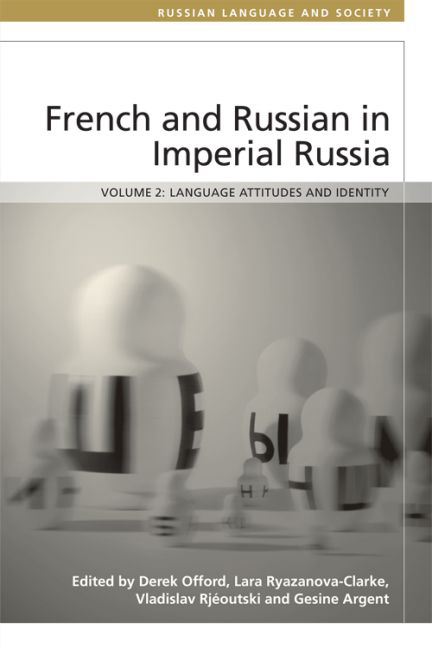Book contents
- Frontmatter
- Contents
- Preface
- Note on Dates, Transliteration and Other Editorial Practices
- Abbreviations Used in the Text, Notes and References
- Dates of Reigns in Eighteenth- and Nineteenth-Century Russia
- Dedication
- Introduction
- 1 The Pan-European Justification of a Multilingual Russian Society in the Late Eighteenth Century
- 2 Princess Dashkova and the Politics of Language in Eighteenth-Century Russia
- 3 Plating ‘Russian Gold’ with ‘French Copper’: Aleksandr Sumarokov and Eighteenth-Century Franco-Russian Translation
- 4 Francophone Culture in Russia Seen through the Russian and French Periodical Press
- 5 Linguistic Gallophobia in Russian Comedy
- 6 The Linguistic Debate between Karamzin and Shishkov: Evaluating Russian–French Language Contact
- 7 Language and Conservative Politics in Alexandrine Russia
- 8 Seduction, Subterfuge, Subversion: Ivan Krylov's Rewriting of Molière
- 9 The French Language of Fashion in Early Nineteenth-Century Russia
- 10 Russian ‘Translations’ of Patrie in the Napoleonic Period
- 11 Treatment of Francophonie in Pushkin's Prose Fiction
- 12 Love à la mode: Russian Words and French Sources
- Conclusion
- Notes on contributors
- Index
Introduction
Published online by Cambridge University Press: 25 October 2017
- Frontmatter
- Contents
- Preface
- Note on Dates, Transliteration and Other Editorial Practices
- Abbreviations Used in the Text, Notes and References
- Dates of Reigns in Eighteenth- and Nineteenth-Century Russia
- Dedication
- Introduction
- 1 The Pan-European Justification of a Multilingual Russian Society in the Late Eighteenth Century
- 2 Princess Dashkova and the Politics of Language in Eighteenth-Century Russia
- 3 Plating ‘Russian Gold’ with ‘French Copper’: Aleksandr Sumarokov and Eighteenth-Century Franco-Russian Translation
- 4 Francophone Culture in Russia Seen through the Russian and French Periodical Press
- 5 Linguistic Gallophobia in Russian Comedy
- 6 The Linguistic Debate between Karamzin and Shishkov: Evaluating Russian–French Language Contact
- 7 Language and Conservative Politics in Alexandrine Russia
- 8 Seduction, Subterfuge, Subversion: Ivan Krylov's Rewriting of Molière
- 9 The French Language of Fashion in Early Nineteenth-Century Russia
- 10 Russian ‘Translations’ of Patrie in the Napoleonic Period
- 11 Treatment of Francophonie in Pushkin's Prose Fiction
- 12 Love à la mode: Russian Words and French Sources
- Conclusion
- Notes on contributors
- Index
Summary
In the first of our two volumes we examined the use of French in eighteenth- and early nineteenth-century Russia and considered factors which governed language choice. In broad surveys and case studies, the contributors to that volume explored such matters as the way Catherine II used French, linguistic practice among the nobility (or at least, among certain sections of it and in certain families), the Russian francophone press, nobles’ personal correspondence, and types of writing and literary forms in which French was used in Russia, such as albums and travel diaries. They studied the phenomenon of codeswitching, analysing factors which might trigger it, and the effect of French on certain areas of Russian lexis, such as architectural terminology and fashion. They also discussed the extent to which Russian elite society was not merely bilingual or even multilingual but, in certain respects, diglossic.
The volume we introduce here focuses more sharply on language attitudes and the relationship between language and identity. In other words, we are now concerned not so much with actual usage as with perceptions of usage and its effects, as these were expressed in language debate, much of which was conducted in journalism or even on the stage. In examining language attitudes in eighteenth- and nineteenth-century Russia, contributors to this volume refer more frequently to certain types of subjective writing, especially imaginative literature and polemical articles or treatises, which were discussed in the section on primary sources in our introduction to Volume 1. Their findings should accordingly be of interest to literary and intellectual historians, who routinely draw on this sort of material, as well as to historical sociolinguists and social historians.
In order to prepare the ground for this investigation into language attitudes and identity marking, we shall use this introduction to contextualise the shift in attitudes towards the use of both French and Russian which we believe can be traced in Russia over the period encompassed by our volumes, from around the mid-eighteenth century to the mid-nineteenth. This was a period in European cultural and intellectual history when the Enlightenment was giving way to Romanticism and when empires were being challenged by the rise of nationalism.
- Type
- Chapter
- Information
- French and Russian in Imperial RussiaLanguage Attitudes and Identity, pp. 1 - 15Publisher: Edinburgh University PressPrint publication year: 2015

